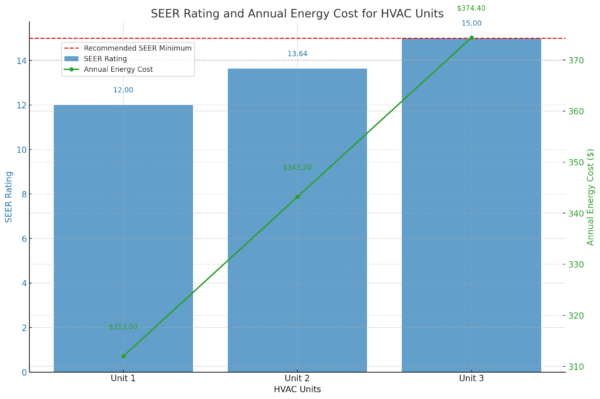Selecting the right HVAC unit for your home involves understanding SEER (Seasonal Energy Efficiency Ratio) ratings, which measure the efficiency of air conditioning systems. This article explains what SEER is and how it impacts your HVAC choices, ensuring you make an informed decision. Below is a summary of the key points we’ll cover.
| Topic | Key Points |
|---|---|
| Introduction | Importance of SEER ratings, overview of main points |
| What is SEER? | Definition, how SEER is calculated, significance of high SEER ratings |
| Benefits of High SEER Ratings | Energy savings, environmental impact, long-term cost benefits |
| Choosing the Right SEER Rating | Factors to consider, balancing cost and efficiency, professional advice |
| Final Thoughts | Recap of benefits, final thoughts |
Understanding SEER ratings is crucial for maximizing the efficiency of your new HVAC unit. Let’s delve into what SEER is and why it matters.
What is SEER?
The Seasonal Energy Efficiency Ratio (SEER) is a metric that measures the efficiency of air conditioning systems over a typical cooling season. The higher the SEER rating, the more energy-efficient the system. Here’s how SEER is defined and calculated:
- Definition: SEER represents the total cooling output (in BTUs) divided by the total electrical energy input (in watt-hours) during a cooling season.
- Calculation: SEER = Total BTU of cooling output / Total watt-hours of energy consumed.
- Significance: A higher SEER rating means the air conditioner uses less energy to cool your home, leading to lower utility bills and a reduced environmental footprint.
Importance of High SEER Ratings
High SEER ratings indicate more efficient HVAC systems, which are particularly beneficial in norther California with long, hot summers. Investing in a unit with a high SEER rating can provide substantial energy savings over time.
Summarizing these points, understanding what SEER is and how it is calculated helps you appreciate the importance of high SEER ratings. Next, we’ll explore the specific benefits of choosing high SEER-rated HVAC systems.
Benefits of High SEER Ratings
Choosing an HVAC system with a high SEER rating offers several advantages:
- Energy Savings: Higher SEER ratings mean more efficient energy use, translating into lower monthly utility bills.
- Environmental Impact: Energy-efficient systems reduce greenhouse gas emissions, contributing to a cleaner environment.
- Long-Term Cost Benefits: Although units with higher SEER ratings might have a higher upfront cost, the energy savings over time can offset the initial investment.
HVAC Energy Cost Chart:

Why Choose a High SEER HVAC System?
High SEER systems are designed to optimize energy use, ensuring your home stays comfortable without excessive energy consumption. This not only benefits your wallet but also supports broader environmental goals by reducing your carbon footprint.
Summarizing these benefits, it’s clear that investing in a high SEER-rated HVAC system offers both economic and environmental advantages. Now, let’s discuss how to choose the right SEER rating for your home.
Choosing the Right SEER Rating
When selecting an HVAC system, consider the following factors to determine the appropriate SEER rating for your needs:
- Climate: In hotter climates, a higher SEER rating can provide greater energy savings.
- Budget: Balance the initial cost of the system with the potential energy savings over time.
- Home Size and Insulation: Larger homes or homes with poor insulation might benefit more from higher SEER ratings.
- Professional Advice: Consult with HVAC professionals to assess your specific needs and recommend the most suitable SEER rating.
Making the Best Choice for Your Home
Choosing the right SEER rating involves evaluating both short-term and long-term benefits. While higher SEER ratings generally provide greater efficiency, it’s important to consider your specific circumstances and consult with experts to make the best decision.
Summarizing these points, balancing cost, climate, and expert advice ensures you select an HVAC system with the optimal SEER rating. Finally, let’s wrap up with some concluding thoughts and a call to action.
Conclusion
Understanding SEER ratings is essential for choosing an energy-efficient HVAC system that meets your needs. By considering factors like climate, budget, and professional recommendations, you can make an informed decision that ensures comfort, energy savings, and environmental benefits. Remember, investing in a high SEER-rated system can lead to significant long-term savings and a reduced environmental impact.
For more detailed information and professional services, don’t hesitate to contact Dale HCS, your local Sonoma County HVAC experts. As a family-owned company, we value customer service and are committed to providing top-notch HVAC solutions to keep your home comfortable year-round.

